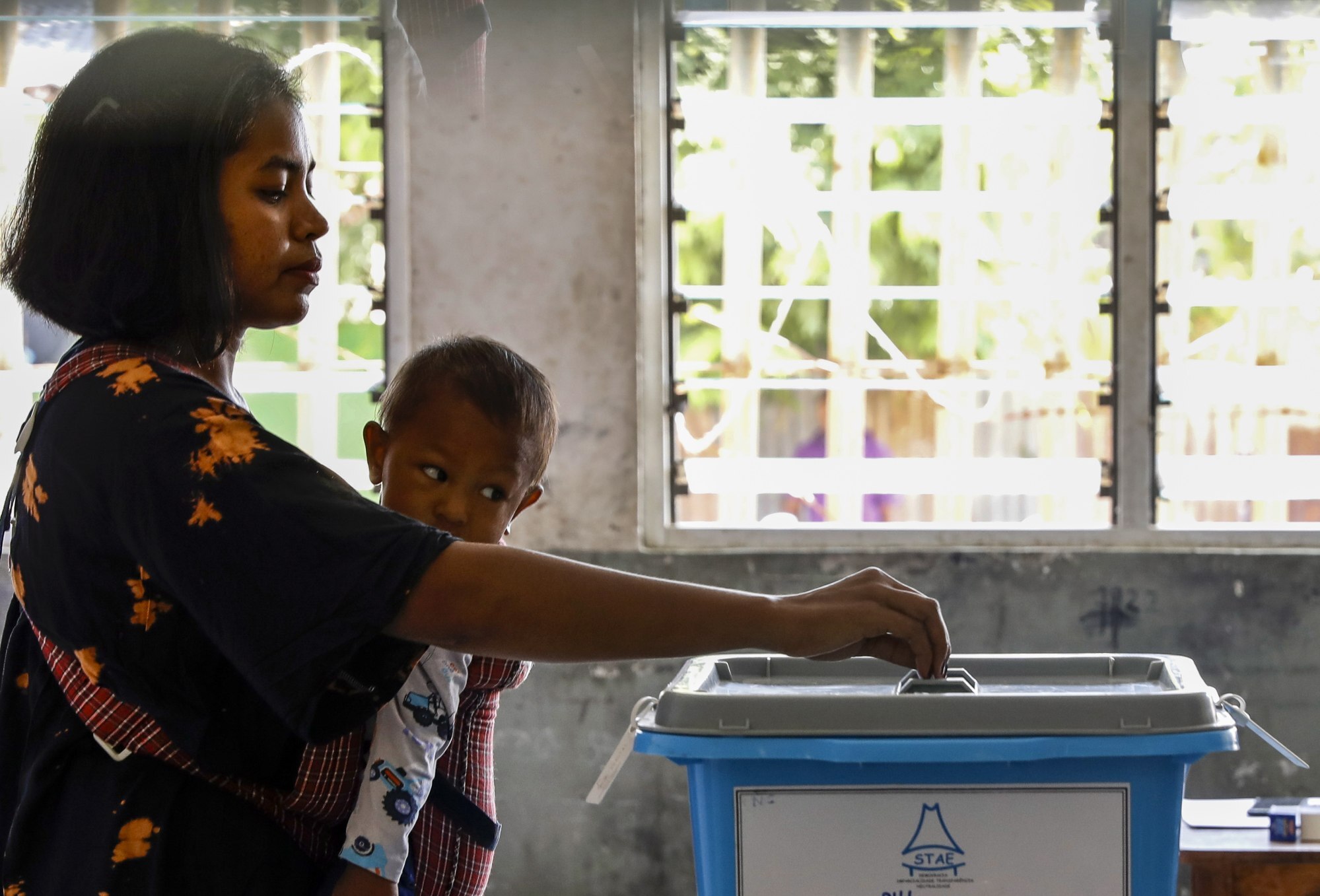
East Timor votes for president in run-off amid political feud
- Jose Ramos-Horta, the front runner is up against incumbent president Francisco ‘Lu Olo’ Guterres in a vote seen as key to the nation’s political stability
- Winner will take office for five years from May 20 – the day East Timor celebrates the 20th anniversary of its independence from Indonesia
People across East Timor went to the polls on Tuesday to choose either a Nobel laureate or a former guerilla fighter – the incumbent president – as their next leader.
Front runner Jose Ramos-Horta has pledged to break a long-standing deadlock between the two main political parties in Southeast Asia’s youngest country should he win the run-off election against President Francisco “Lu-Olo” Guterres.
“If I win … I will hold a dialogue with political parties, including [Guterres’] Fretilin, so they can work together to maintain stability and peace in Timor-Leste,” the Nobel Peace Prize winner told journalists on Tuesday, holding aloft a finger stained purple after casting his vote.

Former guerilla leader Guterres, meanwhile, promised “to ensure national stability, and to adhere to the mission as president of the republic, which is inseparable from the constitution” at a polling station in the capital Dili.
Both candidates have pledged to respect the election results regardless of the outcome.
The poll is a rematch of a 2007 election won handily by Ramos-Horta, a former revolutionary hero.
The winner will take office for five years from May 20 – the day East Timor celebrates the 20th anniversary of its independence from Indonesia, which occupied the former Portuguese colony for 24 years.

Ramos-Horta, East Timor’s president from 2007 to 2012, and Guterres, have blamed each other for years of political paralysis.
In 2018, Guterres refused to swear in nine Cabinet nominees from the National Congress of the Reconstruction of East Timor, known as CNRT, a party led by former prime minister and independence leader Xanana Gusmao, who backed Ramos-Horta’s run for president.
Guterres is from the Revolutionary Front for an Independent East Timor, known by its local acronym Fretilin, which had led resistance to Indonesian rule.
East Timor vote highlights young nation’s political impasse
Fretilin says Ramos-Horta is unfit for president, accusing him of causing a crisis as prime minister in 2006, when dozens were killed as political rivalries turned into open conflict on the streets of Dili.
The latest impasse led to the resignation of Prime Minister Taur Matan Ruak in February 2020. But he agreed to stay until a new government is formed and to oversee the response to the coronavirus pandemic. His government has operated without an annual budget and has relied on monthly injections from its sovereign fund savings, called the Petroleum Fund.
During his campaign, Ramos-Horta declared he would call an early parliamentary election if a new majority – based centrally on the CNRT – could not be negotiated among the parties in the current parliament. Many are concerned that calling an election early will inflame rather than calm inter-party tensions.
Asia must play role in East Timor's future
Ramos-Horta was dominant in the election’s first round on March 19, winning 46 per cent of votes versus President Francisco “Lu-Olo” Guterres’ 22 per cent, but failed to secure the needed majority.
Ramos-Horta’s commanding lead in the first round may yet weaken the current ruling alliance – Fretilin, People’s Liberation Party or PLP, and Khunto – in backing Guterres. Ruak’s PLP party and the rural-based Khunto party, have publicly committed to continuing their alliance with Fretilin until the 2023 parliamentary elections are due.
The former Portuguese colony was occupied by Indonesia for a quarter century and gained independence after a UN-sponsored referendum in 1999. Indonesia’s military responded with scorched-earth attacks that devastated the East Timorese half of the island of Timor.
The transition to a democracy has been rocky, with leaders battling massive poverty, unemployment and corruption. Its economy is reliant on dwindling offshore oil revenues.

Turnout in the March 19 election was 77.26 per cent, or 6 per cent higher than in 2017, the election commission said. Four women were among 16 candidates, the highest number of women taking part in the fifth election since independence.
Nearly 860,000 people in the country of just 1.3 million are eligible to vote, and ballot counting could take several days.
The tiny nation of 1.3 million is still grappling with the Covid-19 pandemic’s impact on its economy.
According to the World Bank, 42 per cent of the population lives in poverty.
Additional reporting by Agence France-Presse

